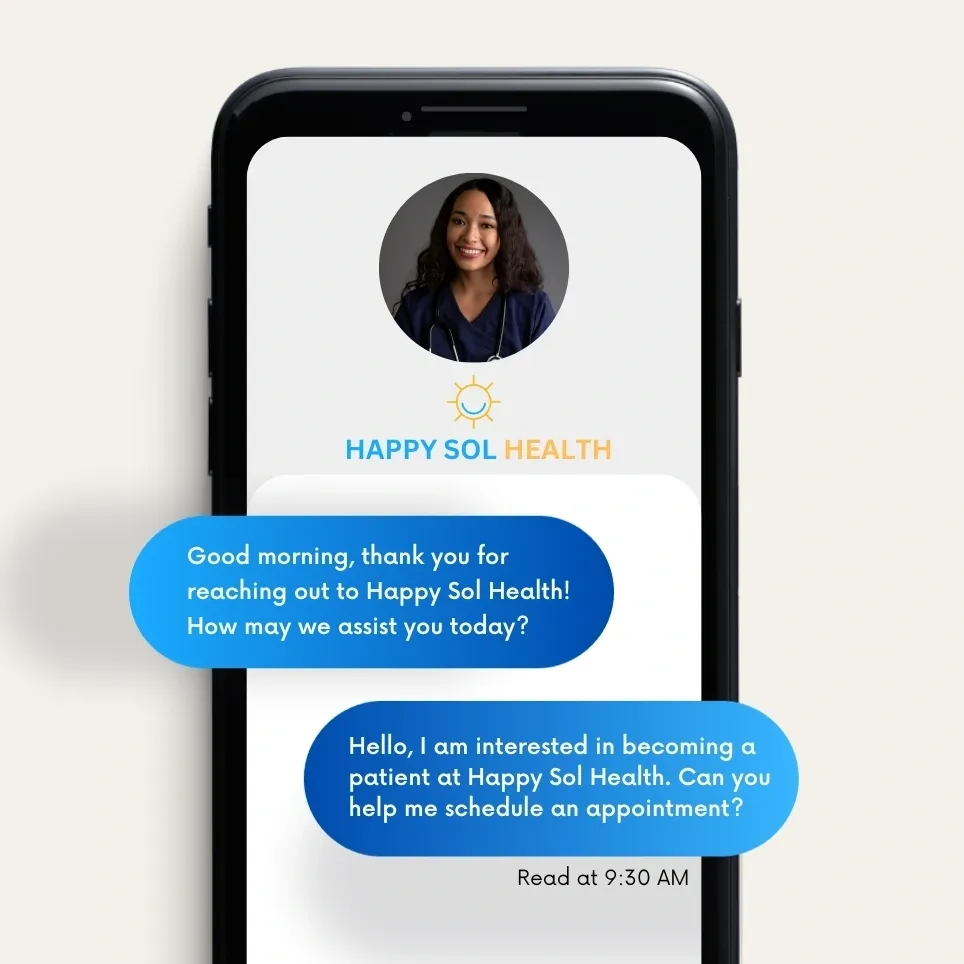What is insomnia?
Insomnia is a common sleep disorder. With insomnia, you may have the inability to sleep well. Insomnia may make it hard for you to get to sleep, stay asleep, or sleep as long as you need to. This happens even if you have the time and the right environment to sleep well. Insomnia can get in the way of your daily activities and may make you feel tired and irritable during the day. It can also make you forgetful, less effective at work, and unhappy. Insomnia can be linked to many things. These include health problems, medicines, and stressful events. Almost everyone experiences insomnia from time to time. Factors such as stress, jet lag, or even diet can affect your ability to get high-quality sleep. Sometimes the problem lasts for a night or two, but in other cases, it’s an ongoing issue.

- Medication Management
- In-person and Virtual appointments are available
- FDA Approved treatment options
- Great support staff that is here to help
You can have:
- Chronic insomnia, which lasts a month or longer
- Chronic (long-term) insomnia occurs 3 or more nights a week, lasts more than 3 months, and cannot be fully explained by another health problem. Chronic insomnia raises your risk of high blood pressure, coronary heart disease, diabetes, and cancer.
- Acute insomnia, which lasts a day, days, or weeks
- Comorbid insomnia, which is associated with another disorder
- Onset insomnia, which is when you have difficulty falling asleep
- Maintenance insomnia, which is the inability to stay asleep
- Short-term insomnia may be caused by stress or changes in your schedule or environment. It can last for a few days or weeks. Sometimes insomnia goes away after lifestyle factors, such as family or work stress, resolve.
Your healthcare provider may ask about your sleep habits and ask you to keep a sleep diary, they may also recommend healthy lifestyle habits such as a regular sleep schedule, therapy, and medicines to help you manage your insomnia.
What are insomnia symptoms?
You can typically recognize insomnia by the following symptoms:
- Difficulty falling asleep at night
- waking up during the night
- waking too early and finding yourself unable to fall back asleep
- spending a lot of the night lying awake, worrying you won’t fall asleep
- a consistent pattern of interrupted or broken sleep that doesn’t refresh you
- trouble falling asleep after going to bed
As a result, you might begin to experience other symptoms related to lack of sleep, including:
- fatigue
- irritability and other mood changes
- difficulty concentrating or remembering things
- Sleep may be possible for only short amounts of time. You may wake up often during the night or be awake for most of the night. This is the most common symptom and affects mostly older adults.
- Daytime tiredness or sleepiness
- Irritability, depression, or anxiety
- Difficulty paying attention, focusing on tasks or remembering
- Increased errors or accidents
- Ongoing worries about sleep
What causes insomnia?
Insomnia may be the primary problem, or it may be associated with other conditions.
Chronic insomnia is usually a result of stress, life events, or habits that disrupt sleep. Treating the underlying cause can resolve the insomnia, but sometimes it can last for years.
Common causes of chronic insomnia include:
- Stress: Concerns about work, school, health, finances or family can keep your mind active at night, making it difficult to sleep. Stressful life events or trauma — such as the death or illness of a loved one, divorce, or a job loss — also may lead to insomnia.
- Travel or work schedule: Causes include jet lag from traveling across multiple time zones, working a late or early shift, or frequently changing shifts.
- Poor sleep habits: irregular bedtime schedule, naps, stimulating activities before bed, an uncomfortable sleep environment, and using your bed for work, eating or watching TV.
- Eating too much late in the evening
Additional common causes of insomnia include:
- Mental health disorders: Anxiety disorders, such as post-traumatic stress disorder, may disrupt your sleep. Awakening too early can be a sign of depression. Insomnia often occurs with other mental health disorders as well.
- Medications: such as some pain medications, allergy and cold medications, and weight-loss products — contain caffeine and other stimulants that can disrupt sleep.
- Medical conditions
- Sleep-related disorders
- Caffeine, nicotine and alcohol

What are insomnia treatment options?
Medications for the treatment of insomnia are called hypnotic medications or sleep medications. Below is a brief discussion of medications that are commonly used for sleep. The treatment options are organized by classes of medication. One class of sleep medication is called benzodiazepines. These medications are older and have a higher potential for dependency.
The following five medications, listed in alphabetical order, are approved by the FDA for the treatment of insomnia:

What causes insomnia?
Benzodiazepines are generally recommended for short-term use because tolerance and dependence can develop. In addition, some medications in this class can produce grogginess the next day.
These newer sleep medications are safer and have a lower potential for dependence and fewer side effects. They’re called “non-benzodiazepines”
The “non-benzodiazepines” are:
- Eszopiclone (Lunesta)
- Zaleplon (Sonata)
- Zolpidem tartrate (Ambien)
- Zolpidem tartrate (extended-release) (Ambien CR)
Follow-up care is a key part of your treatment and safety.
Be sure to make and go to all appointments, and call your doctor if you are having problems. It’s also a good idea to keep a list of the medicines you take.

Speak with a Mental Health Specialist Today!
Our medical professionals are committed to providing personalized care and innovative treatments to ensure you receive the best possible outcome.
